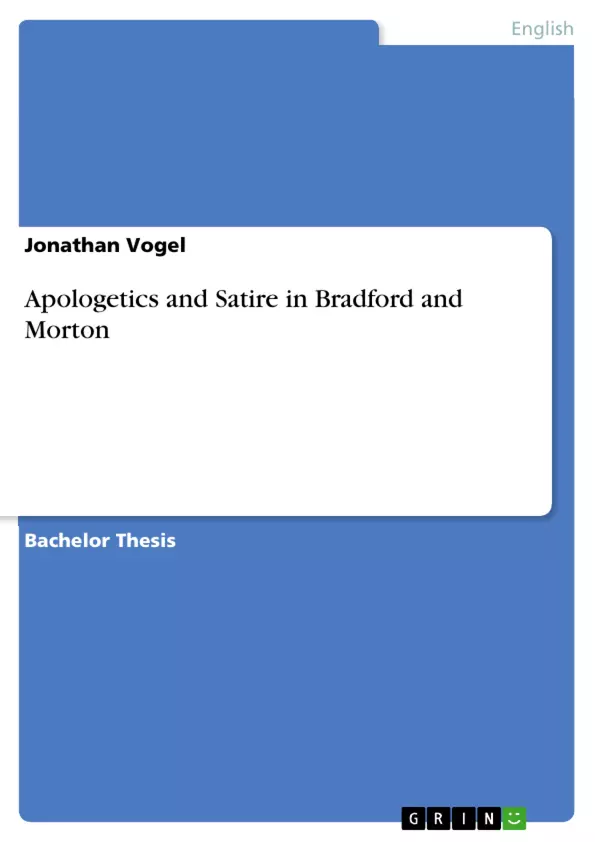It has been argued that the history of the Plymouth Colony is so popular due to its “number of altogether remarkable writers” whose writing was “so graphic, so charged with emotions, so alive with homely details of Plymouth's daily life” (Morison 148). In this paper, I would like to pay special attention to two of those writings: Of Plymouth Plantation by William Bradford and New English Canaan by Thomas Morton, which stand in particular contrast to each other. I will show how these two writers apply literary techniques that correspond to their origins and personal backgrounds. In addition, the contrast and consequent complementarity of the two works will be brought out by contrasting the relevant sections on the same subjects. It will become clear how the respective narrative techniques are used to support one's own point of view and which aspects play into it. The historical background will shortly be outlined before dealing with the question how these two authors made use of these literary techniques to strengthen and defend their position in the ongoing dispute.
Inhaltsverzeichnis (Table of Contents)
- Introduction of the Authors and the Works
- William Bradford
- From Puritans, Separatists and Pilgrims
- Of Plymouth Plantation
- Thomas Morton
- New English Canaan
- Definition: Apologetics and Satire
- Thomas Morton's Satire
- William Bradford as Apologist
- The Surrounding Circumstances
- The Depiction of the Native Population
- The Portrayal of the Land
- Satirical Attacks and Methods of Justification
- Morton's Criticism
- Hypocrisy and His Characterization of the Puritans
- You may see what it is to be Without
- Bradford
- Puritan Lifestyle in New England
- Another troublesome Minister
- Conclusion
Zielsetzung und Themenschwerpunkte (Objectives and Key Themes)
This paper aims to analyze the literary techniques employed by William Bradford and Thomas Morton in their respective accounts of early colonial life in New England. Specifically, it examines how Bradford utilizes apologetics and Morton employs satire to defend their respective positions in a conflict between the Plymouth colonists and a dissenting group. The contrast between their approaches, as well as their personal backgrounds and motivations, will be explored.
- The historical context of early colonial life in New England and the conflict between the Plymouth colonists and Thomas Morton's group.
- The use of apologetics and satire as literary techniques in historical narrative.
- The contrasting perspectives of William Bradford and Thomas Morton on Puritanism, Native American populations, and the nature of colonial society.
- The influence of personal beliefs and experiences on the authors' writing.
- The role of literature in shaping historical narratives and interpretations.
Zusammenfassung der Kapitel (Chapter Summaries)
The first chapter introduces the authors and their respective works, providing biographical details and exploring their personal and religious backgrounds. It examines how their experiences influenced their perspectives on the events they describe. The second chapter defines the terms apologetics and satire and applies them to the writings of William Bradford and Thomas Morton, respectively. The third chapter explores the surrounding circumstances of the conflict, including the authors' portrayals of the Native American population and the land itself.
Schlüsselwörter (Keywords)
Apologetics, satire, William Bradford, Thomas Morton, Of Plymouth Plantation, New English Canaan, Puritanism, Separatists, Pilgrims, early colonial history, Native Americans, New England, literary techniques, historical narrative, religious conflict.
Frequently Asked Questions
What is the main difference between William Bradford's and Thomas Morton's writings?
Bradford writes from a Puritan perspective using apologetics to defend the Plymouth Colony, while Morton uses satire to critique the Puritans and promote his own vision of colonial life.
What are the titles of the two primary works analyzed?
The analysis focuses on "Of Plymouth Plantation" by William Bradford and "New English Canaan" by Thomas Morton.
How does Thomas Morton portray the Native American population?
Morton often provides a more sympathetic or admiring view of Native Americans, contrasting their lifestyle with what he saw as the hypocrisy of the Puritan settlers.
What is the role of satire in Morton's work?
Morton uses satire as a literary weapon to attack the rigid social and religious structures of the Plymouth Colony, portraying the Puritans as intolerant and narrow-minded.
Why are these works considered complementary despite their differences?
By contrasting the same subjects from two opposing viewpoints, the works provide a more holistic understanding of the conflicts and diversity of early colonial New England.
- Arbeit zitieren
- Jonathan Vogel (Autor:in), 2021, Apologetics and Satire in Bradford and Morton, München, GRIN Verlag, https://www.grin.com/document/1153998



